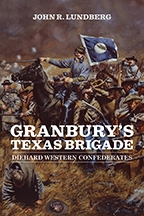
344 pages / 6.00 x 9.00 inches / 13 halftones, 8 maps
History / United States - Civil War Period
John R. Lundberg’s compelling new military history chronicles the evolution of Granbury’s Texas Brigade, perhaps the most distinguished combat unit in the Confederate Army of Tennessee. Named for its commanding officer, Brigadier General Hiram B. Granbury, the brigade fought tenaciously in the western theater even after Confederate defeat seemed certain. Granbury’s Texas Brigade explores the motivations behind the unit’s decision to continue to fight, even as it faced demoralizing defeats and Confederate collapse. Using a vast array of letters, diaries, and regimental documents, Lundberg’s study offers provocative insight into the minds of the unit’s men and commanders. The caliber of that leadership, he concludes, led to the group’s overall high morale.
John R. Lundberg is the author of The Finishing Stroke: Texans in the 1864 Tennessee Campaign as well as many articles on Texas and Civil War history. He currently teaches history at Collin College in Plano, Texas.
“Granbury’s Brigade formed from Texas regiments that earlier endured scorn for surrendering at Fort Donelson and Arkansas Post, emerging from the killing fields at Chickamauga to forge an enduring legacy as some of the hardest-fighting troops in the Army of Tennessee. Despite horrific casualties, these men from all over Texas won countless small battles in the losing campaign for Atlanta before more than half of them fell at Franklin. This is the first detailed, analytical history of the brigade, and as such it more than pays homage to the memory of these diehard Texans. The author mixes extensive research with strong opinions to provide thoughtful insights for both laymen and scholars. He thus places the history of Granbury’s Brigade squarely within the historical debate over such issues as Confederate command in the west, desertion, and Confederate nationalism, to name but a few well-considered topics.”—Richard B. McCaslin, author of Lee In the Shadow of Washington
Found an Error? Tell us about it.